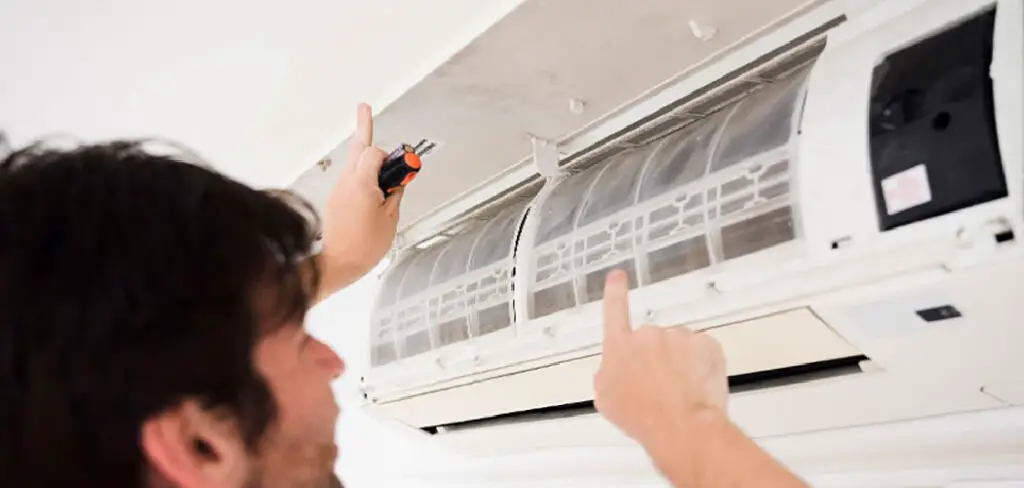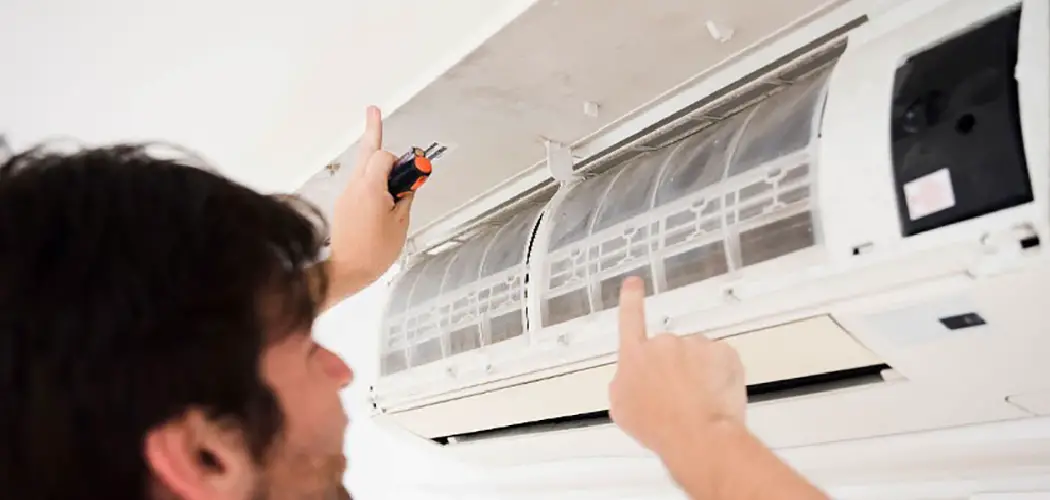Do you ever walk into a room and smell a musty, mildew odor? If so, you’re not alone. Many people experience this smell, which various factors can cause. Chances are, the culprit is your air conditioner.
While an air conditioner can make your home nice and cool during the hot summer months, it can also cause that musty smell if not properly maintained. Musty smell from air conditioners is a common problem, but don’t worry, we’re here to help!

In this post, we’ll discuss the most common causes of musty smells and how to stop musty smell from air conditioner. We’ll also share some tips for keeping your air conditioner in good working order and preventing future smells. Let’s get started!. Keep reading for more information.
What Can Cause Musty Smell?
Musty smells are caused by mold or mildew growth in damp, dark places. Air conditioners can be prone to this because of the moisture they create during their cooling process.
The most common cause of musty smells in air conditioners is a clogged or dirty air filter. When the air filter becomes clogged with dust and debris, it can create a breeding ground for mold and mildew to grow. This can also lead to poor airflow, causing the musty smell to spread throughout your home.
Other potential causes of musty smells in air conditioners include condensation buildup on the coils or drain pan and dirty ductwork.
10 Easy Steps on How to Stop Musty Smell From Air Conditioner
Step 1: Clean Your Air Filter
The first step in preventing musty smells from your air conditioner is to regularly clean or replace your air filter. How often will depend on the type of filter you have and the recommendations from the manufacturer? Generally speaking, it’s a good idea to check and clean (or replace) your air filter at least every three months.
Step 2: Clean Your Coils and Drain Pan
Another common cause of musty smells in air conditioners is condensation buildup on the coils or drain pan. This can be easily fixed by cleaning these components with a coil cleaner or vinegar solution. Be careful not to damage the coils while cleaning, and make sure to disconnect the power before starting.

Step 3: Check for Mold Growth
If you notice any visible mold growth on any parts of your air conditioner, such as the coils or ductwork, it’s important to address this immediately. Use a mild detergent, water solution, or a cleaning product specifically designed for mold removal. Don’t forget to turn off the power before cleaning and wear protective gear, such as gloves and a mask.
Step 4: Clean Your Ductwork
Dirty ductwork can also contribute to musty smells in your home. It’s a good idea to have your ducts professionally cleaned every few years or as needed if you notice any excessive buildup of dust and debris. Make sure to choose a reputable company for this job, as improper duct cleaning can actually worsen indoor air quality.
Step 5: Install a UV Light Air Purifier
Another way to prevent musty smells in your air conditioner is to install a UV light air purifier. This device uses ultraviolet light to kill mold and bacteria before it has a chance to grow and spread throughout your home’s air supply. This step may require the help of a professional HVAC technician.
Step 6: Keep Your Home Ventilated
Proper ventilation in your home is important for preventing musty smells. This can be achieved by using fans or opening windows to prevent moisture buildup, especially during and after cooking or showering. You can also use dehumidifiers in especially damp areas of your home.

Step 7: Fix Any Leaks Promptly
Any leaks from your air conditioner should be fixed immediately, as these can lead to water buildup and mold growth. Regularly check for any signs of water damage or leaks near your air conditioning unit. You can check by feeling for any moist or warm spots on the walls or floors near the unit, as well as inspect the unit itself for any visible water buildup or damage.
Step 8: Keep Your Home Clean
Regular cleaning and dusting will help prevent the buildup of dust and debris in your air conditioner and throughout the rest of your home. At least try to do a thorough cleaning once a week, and don’t forget to clean the vents and any other areas where dust can accumulate.
Step 9: Make Sure Your Air Conditioner is Properly Sized
Ensuring that your air conditioner is properly sized for your home can also help prevent musty smells. A too large unit will create excess moisture, increasing the risk of mold and mildew growth. You can be sure by consulting a professional HVAC technician for assistance in choosing the right size for your home.
Step 10: Schedule Regular Maintenance
Finally, it’s important to have regular maintenance performed on your air conditioning unit to ensure it is functioning properly and preventing musty smells. This can be done by a professional or according to the manufacturer’s recommendations.
Following these steps can help keep your air conditioner clean and odor-free. However, if you are still experiencing musty smells in your home, it may be time to call a professional for further inspection and assistance. Don’t let musty odors linger in your home – take action to eliminate them and improve the air quality for you and your family.

5 Additional Tips and Tricks
- Change your air filter regularly to ensure proper airflow and remove trapped odors.
- Clean or replace your air conditioner’s drain pan to prevent mold growth.
- Keep your AC unit clean by regularly wiping down the exterior and removing any debris from vents and grills.
- Use a dehumidifier in conjunction with your air conditioner to reduce excess moisture in the air.
- Bring in a professional for regular maintenance check-ups to catch any developing problems before they lead to unpleasant odors.
Following these steps can help keep musty smells at bay and maintain a fresh, clean atmosphere in your home or office.
How Often Should You Replace Your Air Filter?
A dirty or clogged air filter is one of the main causes of musty smells in air conditioners. It’s important to regularly replace or clean your air filter to prevent this issue and improve the overall air quality in your home. How often you need to replace your air filter depends on factors such as your specific AC unit, the environment, and how often it is used.
As a general guideline, it’s recommended to check and potentially replace your air filter every 1-3 months.
In addition to regularly replacing your air filter, be sure also to clean any portions of the AC unit that can accumulate dirt or debris. This may include cleaning off the coils and drain pan.
If you continue to have musty smells coming from your air conditioner despite regular filter replacement and cleaning, it may be a sign of mold growth in the unit. In this case, it is best to contact a professional for a thorough inspection and cleaning.
Overall, taking these steps can greatly reduce musty smells and improve the air quality in your home.
You Can Chack It Out to Make Air Conditioner Quieter
Can Forming Musty Smell be Harmful to Your Health?
Musty smells can often indicate the presence of mold or mildew, which can be harmful to your health. Mold exposure can cause symptoms such as respiratory issues, allergies, and headaches.
It is important to address musty smells to prevent potential mold growth and protect your health. If you suspect that there may be mold present in your air conditioner or home, it is best to seek assistance from a professional for further inspection and removal.
Taking steps to improve airflow and reduce excess moisture can also help prevent the development of mold and musty odors. Overall, addressing musty smells not only improves the air quality in your home but also protects your health and well-being.

Can You Spray Air Freshener or Scented Oil to Remove Musty Smells?
Using air fresheners or scented oils may temporarily mask musty smells, but it will not solve the underlying issue causing the odor. To effectively address musty odors, it is important to identify and address the source of the smell. This may include cleaning or replacing your air filter, removing debris from your AC unit, and reducing excess moisture in your home.
Simply using air fresheners or scented oils may also add additional chemicals to the air and potentially worsen any respiratory symptoms for you or your family members. It is best to address musty smells directly rather than simply masking them with fragrances.
You Can Chack It Out to Quiet a Noisy Window Air Conditioner
Conclusion
The musty smell coming from your air conditioner could be a sign of mold or mildew growth. To get rid of the bad odor, you’ll need to clean the unit and remove any visible mold. You can also run a humidifier in your home to help prevent musty smells from developing in the first place.
If your air conditioner is producing musty smells, you can do a few things to get rid of the odor. By taking these steps, you can eliminate musty smells from your air conditioner and enjoy fresh, clean air in your home.
Hopefully, these tips on how to stop musty smell from air conditioner will help keep musty odors away and maintain a comfortable atmosphere in your living space. Happy cooling!
You Can Chack It Out to Check Refrigerant Level in Air Conditioner


